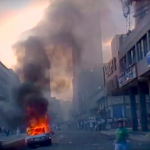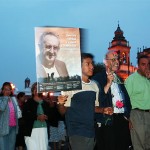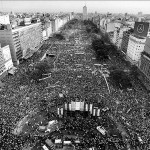 A consequence of the dirty and civil wars was a reconceptualization of what it means to struggle for liberty and equality, against exploitation and oppression. Protest and resistance had to express itself in other ways, and often came from (or helped to produce) new political actors. By the beginning of the twenty-first century, distrust and doubt were rampant throughout Latin America (and also elsewhere), and the stage was set for a last gasp of something like populism, but also the invention of more radical alternatives.
A consequence of the dirty and civil wars was a reconceptualization of what it means to struggle for liberty and equality, against exploitation and oppression. Protest and resistance had to express itself in other ways, and often came from (or helped to produce) new political actors. By the beginning of the twenty-first century, distrust and doubt were rampant throughout Latin America (and also elsewhere), and the stage was set for a last gasp of something like populism, but also the invention of more radical alternatives.
12. Speaking Truth to Power
Protest and resistance had to express itself in other ways, and often came from (or helped to produce) new political actors.
You should also watch the interview video with Rita De Grandis. Then there are the podcasts for this week, as well as student-made videos.
- Alexander Dawson, “Speaking Truth to Power”. Latin America Since Independence: A History with Primary Sources. 2nd Edition. New York: Routledge, 2014. 323-357.
Note that each chapter of the textbook comes with online resources on the publisher's website. Simply click on the relevant tab for this week's reading.
Documents:
- Madres
- "Revolutionary Women's Law" (1994). (Dawson 345; Spanish original; English translation)
- Aguas Blancas Massacre
- "No lo quiero, no" (1988)
- "La alegría ya viene" (1988)
- Chile Thriller Protest (2011)
- The Diario de Juárez Open Letter to the Drug Cartels (2010). (Dawson 346-351; Spanish original)
- Javier Sicilia's Open Letter to Mexico's Politicians and Criminals (2011). (Dawson 351-353; Spanish original; English translation)
Femicide in Latin America
Dictatorship and Resistance
This conversation with Rita De Grandis (Hispanic Studies, UBC) focusses on the Argentine military regime of the 1970s and 1980s, and the protest movement led by the “Mothers of the Disappeared.” It also examines what came of such protests after the dictatorship ended.
“Speaking Truth to Power”
“Speaking Truth to Power”
Speaking Truth to Power II
Antonin Finch, Lauren Hart, and Danni Olusanya:
Back to the Barracks
Alec Dawson (History and International Studies, SFU) discusses the end of military rule in Latin America:
The War on Drugs
Diane Keyes and Michelle Nzioki:
On Rights
Alec Dawson (Professor, History and International Studies, Simon Fraser University), author of Latin America Since Independence: A History with Primary Sources, discusses the proliferation of Rights Claims in Latin America since the end of the Cold War.
This podcast complements chapter ten of his textbook.
Back to the Barracks
Alec Dawson (Professor, History and International Studies, Simon Fraser University), author of Latin America Since Independence: A History with Primary Sources, considers the end of military rule in Argentina in 1983 and Chile in 1990.
This podcast complements chapter ten of his textbook.
Lost Decades
Alec Dawson (Professor, History and International Studies, Simon Fraser University), author of Latin America Since Independence: A History with Primary Sources, considers the introduction of Neoliberal economic reforms in the region and the “lost decade” of the 1980s.
This podcast complements chapter ten of his textbook.
- How does the concept of "human rights" differ from the notion of "civil rights" that we have examined earlier in this course?
- What, if any, was the role of international movements of solidarity during the civil and dirty wars of the 1970s and 1980s? Is there a point to the argument that such movement constitute unwelcome foreign intervention?
- Consider the compromises that many thought were necessary to ensure transitions from dictatorship to democracy, which (for instance) allowed many of those responsible for abuses to go unpunished. Are such trade-offs inevitable?
- What does the Diario de Juárez's Open Letter say about the role of journalism, and its future, in the region?



